实用高中英语惯用法词典
- 格式:doc
- 大小:1.34 MB
- 文档页数:335
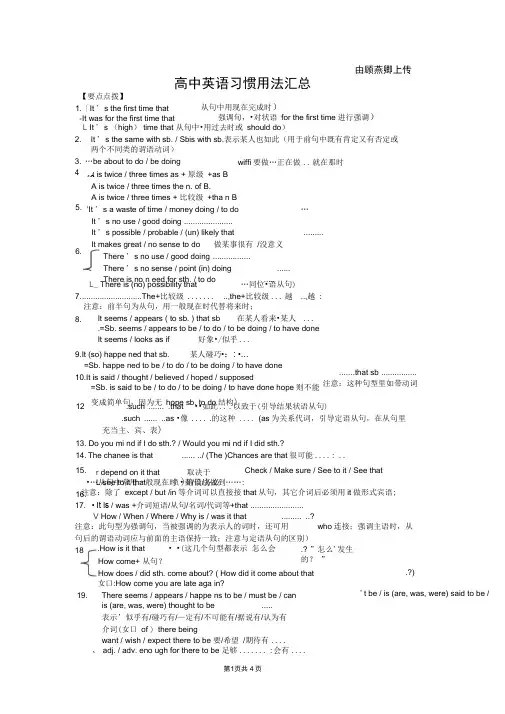
19.高中英语习惯用法汇总由顾燕卿上传【要点点拨】1.「It ' s the first time that-It was for the first time that 从句中用现在完成时) 强调旬,•对状语 for the first time 进行强调)L It ' s (high ) time that 从旬中•用过去时或 should do )2. It ' s the same with sb. / Sbis with sb.表示某人也如此(用于前句中既有肯定又有否定或 两个不同类的谓语动词)3. …be about to do / be doing4 5. wiffi 要做…正在做 .. 就在那时 厂 A is twice / three times as + 原级 +as BA is twice / three times the n. of B. A is twice / three times + 比较级 +tha nB 'It ' s a waste of time / money doing / to do… It ' s no use / good doing ......................It ' s possible / probable / (un) likely that ......... It makes great / no sense to do 做某事很有 /没意义 There ' s no use / good doing ................. There ' s no sense / point (in) doing ......There is no n eed for sth. / to do ..... 6. L_ There is (no) possibility that …同位•语从句) 7. ...........................The+比较级 ....... ..,the+比较级 ... 越 ..,越 :注意:前半句为从句,用一般现在时代替将来时;8. It seems / appears ( to sb. ) that sb 在某人看来•某人 ... .=Sb. seems / appears to be / to do / to be doing / to have done It seems / looks as if 好象•/似乎 ... 9.It (so) happe ned that sb. 某人碰巧•:: •…=Sb. happe ned to be / to do / to be doing / to have done10.It is said / thought / believed / hoped / supposed =Sb. is said to be / to do / to be doing / to have done hope 则不能变成简单句,因为无 hope sb. to do 结构)...... .that sb ................ 注意:这种句型里如带动词 12 .such ....... .that ••如此 .. .以致于(引导结果状语从句) .such ...... ..as •像 .... .的这种 .... (as 为关系代词,引导定语从句,在从句里 充当主、宾、表)13. Do you mi nd if I do sth.? / Would you mi nd if I did sth.? 14. The chanee is that ...... ../ (The )Chances are that 很可能 .... : .. 15. Check / Make sure / See to it / See that •…从句中常用一般现在时 )确信/务必 16. r depend on it that 取决于 L see to it that 负•责/设法做到……:注意:除了 except / but /in 等介词可以直接接that 从句,其它介词后必须用it 做形式宾语; 17. • It is / was +介词短语/从句/名词/代词等+that........................ V How / When / Where / Why is / was it that ......... ..?注意:此句型为强调句,当被强调的为表示人的词时,还可用 who 连接;强调主语时,从句后的谓语动词应与前面的主语保持一致;注意与定语从句的区别) 18 .How is it that • •(这几个句型都表示 怎么会 How come+ 从句? How does / did sth. come about? ( How did it come about that女口:How come you are late aga in?There seems / appears / happe ns to be / must be / can is (are, was, were) thought to be .....表示’似乎有/碰巧有/—定有/不可能有/据说有/认为有介词(女口 of ) there beingwant / wish / expect there to be 要/希望 /期待有 ....、 adj. / adv. eno ugh for there to be 足够 ....... :会有 .....? ”怎么'发生的? ” .?) 't be / is (are, was, were) said to be /注意:there being / there to be 为there be 的非谓语形式;It is said / thought that there is / are =There is / was / are / were said (thought) to be 女口:...I have n ever dream of there being such a good cha nee for me.It won ' t be cold eno ugh for there to be a frost toni ght.20. 疑问词+插入语+陈述语序?Who do you think he ' II have attend the meeting?21. But for + n. / pron., sb. / sth. would (not) have done 要不是…某人早就......... (表示虚拟语气)=lf it had not been for ….., ................ ./If there had not been .................... ., ......22. - It won(' t) be longdoe +从句(从句中用一般现在时)不久/很久就要....It was (not) long before+从句(从句中用一般过去时)不久/很久才..... .23. ' Those who ................从句及主句中谓语动词用复数形式).•Anyone who ................. = Whoever ......... 从句及主句中谓语动词用单数形式)24 ..... .主句(一般现在时或过去时)…...when 从句….(might / should do 或might / should have done)表示”对比”意思为本该……(可)而却”主句中为陈述语气,从句里为虚拟语气,如:Why are you here when you should be in school?你本该上学的怎么在这儿?He stopped trying when he might have succeeded .本该已成功了他去卩停止努力了There is ./ Sb. have no doubt that 同位语从句(that 不可省略)There is / Sb. have some doubt whether 同位语从句不可用if)Sb. doubt if / whether ....Sb. don ' t doubt that ..........immediately / directly / in sta ntly / the mome nt + 从句on / upon + n. / doingNo sooner had sb. done than 过去时)(Hardly had sb. done when . ..(过去时)注意:这几个结构都表示一……•就”27. r~every time / each time / the last time / the first time / next time + 从句(名词性短语引导-一个时间状语L句)any where / everywhere +从句(相当于wherever引导的地点状语从句)You can go any where you like.Next time you come, please bring your son along.28.If only / I wish +从句(用过去类时态)表示虚拟语气,要是……•就好了”但愿……就好了!”29 .Considering + n.或pron.或that 从句/ Seeing that •…考虑到/鉴于............-Given + n. / pron作状语,表示在有....... 的情况下”如果有”假定”有时也表示"考虑到”Seeing (that) he refused to help us, there is no reas on why we should help him now.Given good health, I hope to finish the work this year.Given their inexperienee / that they are inexperieneed, they ' ve done a good job. 3O.There was a time when 语经有那么一度.......31.other than与no, not, none等否定词连用,表示肯定意思,如:It was none other than Mr. Smith.这正是Smith 先生.32. - Not until ............... .did / do/ does / will sb. do .......T It was / is not un til ...... that sb .............33.It ' s (un) like sb. to do / to have done做某事很像某人…/做某事可不像某人34.It remains to be seen Wh--words ......... 是否.... 还有待于看.(不用that, if 作连接词)35.It only remai ns for sb. to do 剩下的只是要某人做某事.we ve got everyth ing ready. It only rema ins for you to come to dinner.36.One moment ....... ., and now •…刚•才一会儿还在做.. 而现在却.... ..37. Not all / both / everyo ne 表示部分否定38. Such is / are 这・(•些)就是…….(谓语动词单复数由后面名词决定)39. y I' d rather (not) do / have done 我宁愿……I ' d rather从句(从句中用过去时或过去完成时)40.lt ' s important / necessary / strange / surprising 用陈述语气或haihould・d()41.1 like / hate / appreciate it that / when等从句(it表示后面从句的这种情况)I appreciate it if you will give me a hand.42. By the time +从句(一般现在时/过去时),主句(将来完成时/过去完成时)43 ....... ., as is often the case with sb. / as is usual with sb.(as引导非限制性定语从句)44 in case / lest / for fear that 从句中用陈述语气或should do)45. While置于句首可表示As long as或AlthoughWhile there is life there is hope.While I admit his good poin ts, I can see his bad on es.46. 「can not ( never) ....... too +adj. (adv. ) / adj. (adv.) + enoifeh•… 越好” 非常” “too + adj. ( an xious / eager / willi ng / ready / glad 等)+to do ••表示肯定意思lean ' t thank you enou我非常感激你.He was too glad to see his father.=He was very glad to see his father.47. not / neve等表示否定的词与比较级连用表示最高级,如:——Do you agree with his suggestion? ----- I can ' t agree more.48. What if •…要是……•怎么办?What if he doesn ' t come tomorrow?49. more ....... ..tha与其.... .不如 ... .He is more n ervous tha n frighte ned.50. It is / has been + 一段时间+since从句(从句中如为延续性动词,则实际表示的意思相反) It is twoyears since he drank.他不喝酒已两年了.【各个击破】1. Mr. Smith didn ' t understand ___________ made his son so upset this morning.A. what was itB. why it was thisC. how that wasD. what it was that2. ——Did you have a good sleep last ni ght?——Yes, n ever sleep ____ .A. badlyB. betterC. worseD. best3. We are only _____ glad to do any thi ng we can ______ her.A. too; to helpB. very; help C too; help D. very; help ing4. ——How come you are late for class aga in?A. Because I missed the busB. By bus and the n on footC. Please excuse meD. It ' s quite wrong5. _______ m ore tha n 3,000 Ian guages in the world.A. There are thought to beB. There is thought to beC. They are thought to beD. It is thought to be6. ——George is a wise pers on.——But in my opinion, he is _____ tha n wise.A. clevererB. braverC. more braveD. less brave7. ——So can I ask you a few fairly straightforward questi ons about yourself?——No problem. I like ______ whe n people are ope n and direct.A. thatB. thisC. itD. them8. —— ____ I move the picture over here?——I suppose it ' ll look better.A. How ifB. What aboutC. How aboutD. What if9. China has produced ______ this year as it did in 2002.A. as twice much steelB. twice steel as muchC. twice as much steelD. as much steel twice10. ——____ was it ______ you discovered the secret of his?----- T otally by cha nee.A. How; whe nB. What; thatC. What; whe nD. How; that11. --- Who on earth could it be?------ It was _____ other than Clint Eastwood.A. noneB. nothingC. notD. nobody12. ____ his age, he did it quite well, so don ' t ______ him any more.A Given; blame B. Considered; say C. To regard; scold D. Considering; speak13. _____________ N o sooner ____________________________ themselves in their seats in the theatre the curtain went up.A. they have settled; beforeB. had they settled; thanC. have they settled; whenD. they had settled; than14. -- Did you meet with the famous space hero, Yang Liwei?---- _____ I had come here earlier!A. If onlyB. If notC. But forD. For fear15. ___________________________ The students expected more reviewing classes before the final exams.B. there beingC. it to beD. there to be't be given so difficult a problem they can not work out. C. while D. as ' clock at midnight C. since D. when 't difficult, was it? 't think could pass it. C. everybody D. nobody19. I always take care when doing papers on the computer.---- You meant it! One can not be _______ careful working on it. A. too B. very C. so D. quite20. --- Is Miss White working these days?------ No. It is two months since she worked here.------ Oh, ____________ ?A. where is she working nowB. would you please show me the wayC. which is her officeD. is she illA. it would be 16.Students shouldn A. thatB. which 17. It was twelve o A. that B. before 18. The exam wasn ----- No, but I don A. somebody B. anybody they arrived at a lonely village.。
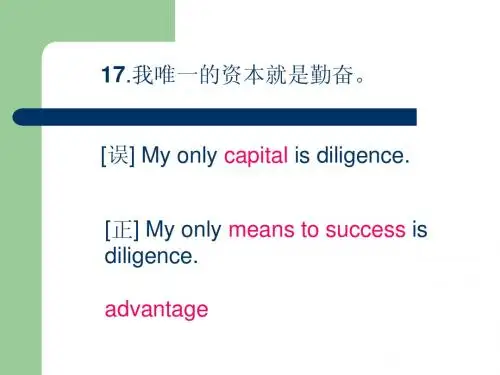
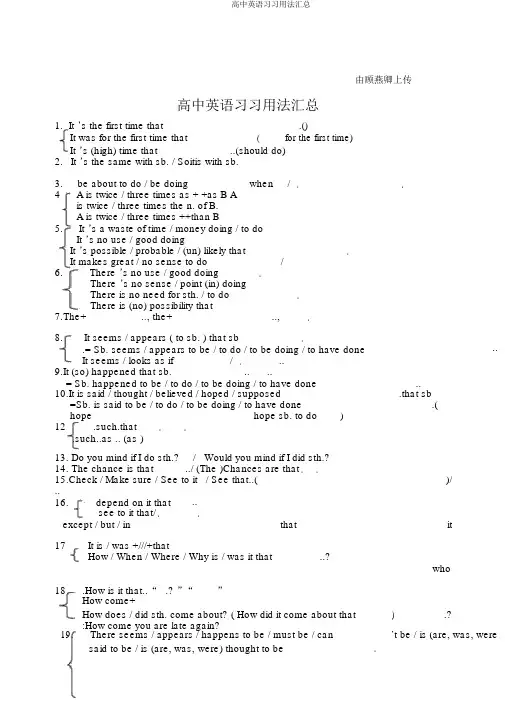
由顾燕卿上传高中英语习习用法汇总1. It ’ s the first time that.()It was for the first time that ( for the first time)It ’ s (high) time that..(should do)2.It ’ s the same with sb. / Soitis with sb.3. be about to do / be doing when / . .4 A is twice / three times as + +as B Ais twice / three times the n. of B.A is twice / three times ++than B5.It ’ s a waste of time / money doing / to doIt ’ s no use / good doingIt ’ s possible / probable / (un) likely that .It makes great / no sense to do/6.There ’ s no use / good doing .There ’ s no sense / point (in) doingThere is no need for sth. / to do .There is (no) possibility that7.The+.., the+.., .8.It seems / appears ( to sb. ) that sb ....= Sb. seems / appears to be / to do / to be doing / to have doneIt seems / looks as if/ . ..9.It (so) happened that sb.....= Sb. happened to be / to do / to be doing / to have done..10.It is said / thought / believed / hoped / supposed.that sb=Sb. is said to be / to do / to be doing / to have done.(hope hope sb. to do)12.such.that . ..such..as .. (as )13. Do you mind if I do sth.?/ Would you mind if I did sth.?14. The chance is that../ (The )Chances are that. .15.Check / Make sure / See to it / See that..()/..16.depend on it that..see to it that/. .except / but / inthat it17It is / was +///+thatHow / When / Where / Why is / was it that..?who18.How is it that..“.? ”“”How come+How does / did sth. come about? ( How did it come about that).?:How come you are late again?19.There seems / appears / happens to be / must be / can’ t be / is (are, was, weresaid to be / is (are, was, were) thought to be .“ . / / / / / ..”of there beingwant / wish / expect there to be / / ..adj. / adv. enough for there to be . . there being / there to be there beIt is said / thought thatthere is / are=There is / was / are / were said (thought) to be . I have never dream of there being such a good chance for me.It won ’ t be cold enough for there to be a frost tonight.20. ++ Who do you think he ’ ll have attend the meeting? 21. But for + n. / pron., sb. / sth. would (not) have done ...,( )=If it had not been for .., ./If there had not been., .. / . 22. It won( ’ t) be longforebe +It was (not) long before+ /.. 23. Those who.( ).)Anyone who= Whoever..( 24 . ...when .(might / should do might / should have done) ” ”, “ ( ) ”, , , :Why are you here when you should be in school?? He stopped trying when he might have succeeded . . 25. There is ./ Sb. have no doubt that ( ,that )There is / Sb. have some doubt whether ..(if) Sb. doubt if / whether . 26Sb. don ’ t doubt that . immediately / directly / instantly / the moment + on / upon + n. / doing .( )No sooner had sb. done thanHardly had sb. done when ..( )“ . ”27. every time / each time / the last time / the first time / next time +anywhere / everywhere + whereverYou can go anywhere you like. Next time you come, please bring your son along. 28.If only / I wish + ( ) , “ . ” “ ! ” 29 .Considering + n. pron. that / Seeing that . / . Given + n. / pron , “ ” “ ” “ ”, ” ”Seeing (that) he refused to help us, there is no reason why we should help him now.Given good health, I hope to finish the work this year. Given their inexperience / that they are inexperienced, they ’ ve done a good 30.There was a time when . . 31.other than no, not, none , , : It was none other than Mr. Smith. Smith . 32. Not until .did / do/ does / will sb. do It was / is not until that sb 33.It ’ s (un) like sb. to do / to have done / 34.It remains to be seen Wh-- words .. . .( that, if )35.It only remains for sb. to do .We’ ve got everything ready. It only remains for you to come to dinner.36.One moment., and now方才一会儿还在做而此刻却..37.Not all / both / everyone表示部分否认38. Such is / are这(些.. )就是.(谓语动词单复数由后边名词决定)39.I ’ d rather (not) do / have done我情愿..I’ d rather从+句(从句顶用过去时或过去达成时)40. It ’importants / necessary / strange / surprising .+that (用陈说语气或 should do)41. I like / hate / appreciate it that / when 等从句(it 表示后边从句的这类状况 ) Iappreciate it if you will give me a hand.42.By the time +从句(一般此刻时 /过去时),主句(未来达成时 /过去达成时)43., as is often the case with sb. / as is usual with sb.(as指引非限制性定语从句)44 in case / lest / for fear that从句顶用陈说语.(气或should do)45.While 置于句首可表示As long as 或 AlthoughWhile there is life there is hope.While I admit his good points, I can see his bad ones.46.can not ( never)too +adj. (adv. ) / adj. (adv.) + enough越越好”“特别“”too + adj. ( anxious / eager / willing / ready / glad 等 )+to do .表示一定意思 Ican ’ t thank you enough我非.常感谢你 .He was too glad to see his father.=He was very glad to see his father.47.not / neve 等表示否认的词与比较级连用表示最高等,如:-----Do you agree with his suggestion? ------- I can ’ t agree more.48.What if 假如.. .怎么办?What if he doesn t come’ tomorrow?49.more..than与其 .不如 .. He is morenervous than frightened.50. It is / has been + 一段时间 +since 从句 (从句中如为持续性动词,则实质表示的意思相反 )It is two years since he drank.他不饮酒已两年.了【各个击破】1. Mr. Smith didn’ t understand ______ made his son so upsetmorningthis.A. what was itB. why it was thisC. how that wasD. what it was that2.-----Did you have a good sleep last night?----Yes, never sleep _______.A. badlyB. betterC. worseD. best3. We are only _____ glad to do anything we can _______ her.A. too; to helpB. very; help C too; help D. very; helping4.-----How come you are late for class again?-------_____________.A. Because I missed the busB. By bus and then on footC.Please excuse me D. It ’ s quite wrong 5. _______morethan 3,000 languages in the world. A. There are thoughtto be B. There is thought to be C. They are thought to beD. It is thought to be6.-----George is a wise person.-----But in my opinion, he is ______ than wise.7.-----So can I ask you a few fairly straightforward questions about yourself?-----No problem. I like ________ when people are open and direct.A. thatB. thisC. itD. them8. ----______I move the picture over here?----I suppose it’ ll lookerbett.A. How ifB. What aboutC. How aboutD. What if9. China has produced ______ this year as it did in 2002.A. as twice much steelB. twice steel as muchC. twice as much steelD. as much steel twice10.-----_______was it ______ you discovered the secret of his?------Totally by chance.C. What; whenD. How; thatA. How; whenB. What; that11.-----Who on earth could it be?------It was _______ other than Clint Eastwood.A. noneB. nothingC. notD. nobody12._____his age, he did it quite well, so don’ t ______ him any more.A Given; blame B. Considered; say C. To regard; scold D. Considering; speak13.No sooner _____ themselves in their seats in the theatre ______ the curtain went up.A. they have settled; beforeB. had they settled; thanC.have they settled; when D. they had settled; than14.-----Did you meet with the famous space hero, Yang Liwei?------______I had come here earlier!A. If onlyB. If notC. But forD. For fear15.The students expected __________ more reviewing classes before the final exams.A. it would beB. there beingC. it to beD. there to be16.Students shouldn’ t be given so difficult a problem _____ they can not work out.A. thatB. whichC. whileD. as17. It was twelve o’ clockmidnightat _______ they arrived at a lonely village.A. thatB. beforeC. sinceD. when18.----- The exam wasn ’ t difficult, was it?------ No, but I don’ t think ______could pass it.A. somebodyB. anybodyC. everybodyD. nobody19.-----I always take care when doing papers on the computer.-----You meant it! One can not be_______careful working on it.A. tooB. veryC. soD. quite20.-----Is Miss White working these days?------No. It is two months since she worked here.------Oh,_____________?A. where is she working nowB. would you please show me the wayC. which is her officeD. is she ill。
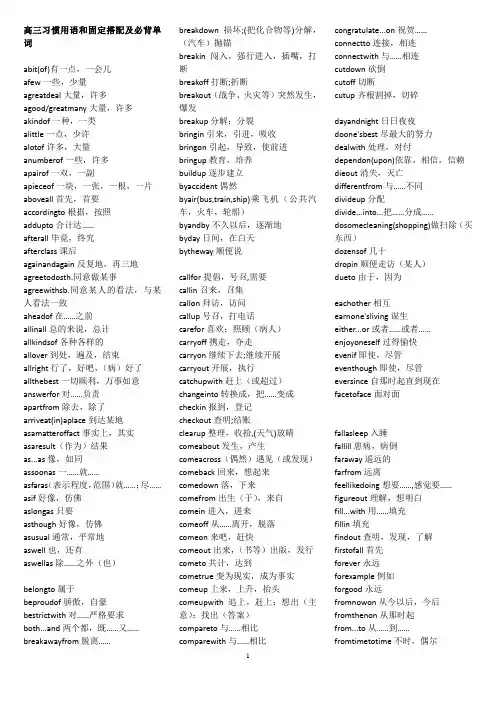
高三习惯用语和固定搭配及必背单词abit(of)有一点,一会儿afew一些,少量agreatdeal大量,许多agood/greatmany大量,许多akindof一种,一类alittle一点,少许alotof许多,大量anumberof一些,许多apairof一双,一副apieceof一块,一张,一根,一片aboveall首先,首要accordingto根据,按照addupto合计达……afterall毕竟,终究afterclass课后againandagain反复地,再三地agreetodosth.同意做某事agreewithsb.同意某人的看法,与某人看法一致aheadof在……之前allinall总的来说,总计allkindsof各种各样的allover到处,遍及,结束allright行了,好吧,(病)好了allthebest一切顺利,万事如意answerfor对……负责apartfrom除去,除了arriveat(in)aplace到达某地asamatteroffact事实上,其实asaresult(作为)结果as...as像,如同assoonas一……就……asfaras(表示程度,范围)就……;尽……asif好像,仿佛aslongas只要asthough好像,仿佛asusual通常,平常地aswell也,还有aswellas除……之外(也)belongto属于beproudof骄傲,自豪bestrictwith对……严格要求both...and两个都,既……又……breakawayfrom脱离……breakdown损坏;(把化合物等)分解,(汽车)抛锚breakin闯入,强行进入,插嘴,打断breakoff打断;折断breakout(战争、火灾等)突然发生,爆发breakup分解;分裂bringin引来,引进,吸收bringon引起,导致,使前进bringup教育,培养buildup逐步建立byaccident偶然byair(bus,train,ship)乘飞机(公共汽车,火车,轮船)byandby不久以后,逐渐地byday日间,在白天bytheway顺便说callfor提倡,号召,需要callin召来,召集callon拜访,访问callup号召,打电话carefor喜欢;照顾(病人)carryoff携走,夺走carryon继续下去;继续开展carryout开展,执行catchupwith赶上(或超过)changeinto转换成,把……变成checkin报到,登记checkout查明;结账clearup整理,收拾,(天气)放晴comeabout发生,产生comeacross(偶然)遇见(或发现)comeback回来,想起来comedown落,下来comefrom出生(于),来自comein进入,进来comeoff从……离开,脱落comeon来吧,赶快comeout出来,(书等)出版,发行cometo共计,达到cometrue变为现实,成为事实comeup上来,上升,抬头comeupwith追上,赶上;想出(主意);找出(答案)compareto与……相比comparewith与……相比congratulate...on祝贺……connectto连接,相连connectwith与……相连cutdown砍倒cutoff切断cutup齐根割掉,切碎dayandnight日日夜夜doone'sbest尽最大的努力dealwith处理,对付dependon(upon)依靠,相信,信赖dieout消失,灭亡differentfrom与……不同divideup分配divide...into...把……分成……dosomecleaning(shopping)做扫除(买东西)dozensof几十dropin顺便走访(某人)dueto由于,因为eachother相互earnone'sliving谋生either...or或者……或者……enjoyoneself过得愉快evenif即使,尽管eventhough即使,尽管eversince自那时起直到现在facetoface面对面fallasleep入睡fallill患病,病倒faraway遥远的farfrom远离feellikedoing想要……,感觉要……figureout理解,想明白fill...with用……填充fillin填充findout查明,发现,了解firstofall首先forever永远forexample例如forgood永远fromnowon从今以后,今后fromthenon从那时起from...to从……到……fromtimetotime不时,偶尔1getalongwith与……相处getaway逃;离getback返回;回来;回家getclose(to)接近getdown降下getdownto开始认真(做某事)getin进入,收获,达到getoff脱下(衣服等);下车geton上车;过活getonwithsb.与……相处getthrough通过,拨通(电话)gettogether聚会,联欢getup起床giveaway分发giveback归还;送回givein屈服,让步giveout分发giveup放?goahead走在前面,领先;干吧,干下去goaway走开,离去goby走过;经过;过去gofishing(shopping,skat ing)(去)钓鱼(买东西,滑冰)gofor主张goforawalk散步goinfor参加,喜欢gooff走开goon继续goondoing...继续干某事,不停地干某事goonwith继续goout出去,熄灭goover仔细检查,复习gothrough浏览;翻阅,通过growup长大成人,成长hadbetter(do)最好(做)handin上交;交纳handout分发haveacold患感冒hangon(打电话时)不挂断,等待片刻hangup挂断电话haveagiftfor对……有天赋haveagoodtime玩得高兴,过得愉快haveclasses上课havefunwith玩得高兴havegotto不得不;必须haveto不得不;必须hearof听说,知道hearfrom收到……的来信helponeselfto请随便吃点helpsb.withsth.帮助某人做某事help...out帮助某人解决困难holdon等一等(别挂电话)holdone'sbreath不出气,屏住呼吸holdout伸出;坚持,维持holdup阻挡,使停顿hundredsof几百,成百上千hurryup赶快,快点inahurry匆忙,很快地inall总之inaword简言之,总之incommon共同,共有indebt欠债indanger处在危险状态infact事实上,实际上infrontof在……前面inneedof需要,缺少inorder按顺序inorderthat为了inorderto为了inotherwords换句话说inpeace安静,宁静inpublic当众;公开insurprise吃惊,惊讶intheend最后,终于intime及时,来得及insteadof代替,而不是joinin参加,加入joinup联合起来,联结起来justnow现在,刚才keepback留下keepdoingsth.继续做某事keepoff勿踏;勿踩keepon继续(进行)keepone'sword守信keepup保持;维持;继续knockat敲knockintosb.撞上laughat嘲笑leadto导致,导向letin让……进来,放进letout放掉,泄露liveon以……为主食,靠……为生lookafter照顾lookahead向前看,展望未来lookdownupon看不起,轻视lookfor寻找lookforwardto盼望lookinto向……里面看去;调查lookout留神,当心lookthrough看穿,浏览lookup查找lotsof许多,大量makeaface做鬼脸,做苦脸makefriendswith与……交朋友makeup和解,化装makeupof由……组成,构成makeupone'smind下决心millionsof成百万上千万,数以百万计moreorless或多或少neither...nor既不……也不……nextto紧接着,相邻,次于nodoubt无疑地nolonger不再notanymore不再notatall一点也不,绝非notonly...butalso不仅……而且……notso...as不像,不如nottill/until直到……才nowandthen不时,偶尔nowthat既然ofcourse当然on(the,an)average平均,按平均数计算onduty值日,值班onfoot走路,步行onshow展出,在上演(放映)ontime准时on/overtheradio通过收音机onceagain再一次oncemore再一次onceuponatime从前,很久以前oneafteranother一个接一个openup开启;开创;开辟orelse否则,要不然2oughtto应该outofbreath上气不接下气outoforder运转不正常,出毛病outofwork失业overandoveragain反复,多次重复passby经过payattentionto注意payback偿还(借款等)payfor付款payoff偿清(欠款等) persuadesb.todo说服pickout选出pickup拾起,捡起,接收;开车去接……pointout指出pointto指向prevent...from妨碍,防止,预防putaway储存putdown记下putoff推迟puton穿,戴上,上演putonaperformance演出putonweight发福,增加体重putout扑灭,关熄putup挂起,举起,贴(广告等)putupwith忍受ratherthan而不,非referto提到,涉及,有关regard...as把……看作ringback回电话ringoff挂断电话,停止讲话ringup打电话给rightaway立即,马上rightnow立即,马上runaway逃跑,失控runoutof用完saveone'slife挽救某人生命scoresof许多,大量see...off为某人送行sellout卖完,出卖sendfor派人去叫(请)sendout发出,派遣sendup发出,射出sentence...todeath判处死刑separate...from...分开setdown放下setfree释放,解放setoff动身,起程;使爆发setout出发;开始setup建立创立showoff炫耀settledown定居,平静下来sidebyside肩并肩,一起soasto以便,为的是sofar到目前为止sofaras(表示程度,范围)就……,尽……solongas只要so...that太……以至于……soonerorlater迟早,早晚speedup加快速度spend...on在……花钱standfor代表,象征tickto坚持stopdoingsth.停止做某事stoptodosth.停下来做某事struggleagainst同……作斗争suchas例如takeaway拿走takeiteasy别着急,别紧张takeoff脱下,起飞takeone'stime从容,慢慢行动takeout取出takeplace发生takesb.inthearms搂抱taketheplaceof取代,代替takeup占去,占据(时间、地位等)talkabout谈论,议论talkof谈论,议论thedayaftertomorrow后天thedaybeforeyesterday前天themore...themore...越……就越……theotherday前几天,某日thinkabout考虑(是否去做)thinkof想起,考虑;认为,看法thousandsof成千上万,几千throwaway扔掉too...to太……以至于不……tryon试穿,试试看tryout试验turndown关小,调低turnoff关掉(水、电、电视、收音机等)turnon打开(水、电视、收音机、灯、煤气等)turnover翻动,犁翻(土地)turnup到达,来到;开大(声音)upanddown上下,来回usedtosth.习惯于usedtodosth.过去常常waitfor等候,等待wakeup醒来workout算出,解决worryabout担心,烦恼wrapup包好,伪装writedown写下,记下writeto写信给……单词拼写必背一、一个星期七天1.Monday2.Tuesday3.Wednesday4.Thursday5.Friday6.Saturday7.Sunday二、一年十二个月1.January2.February3.March4.April5.May6.June7.July8.August9.September10.October11.November 12.December三、一年四季1.spring2.summer3.autumn4.winter四、容易拼写错的数字1. eighth第八2. ninth第九3. forty四十4. twelfth第十二5. twentieth第二十四、亲属称呼1. daughter(女儿)2. niece(女性晚辈)3. nephew(男性晚辈)4. cousin(同辈兄弟姐妹)5. aunt(女性长辈)6. uncle(男性长辈)五、以下动词加-ed或-ing要双写最后一个字母1. regret(regretted,regretting)后悔2. control(controlled,controlling)控制3.admit(admitted,admitting)承认4.occur(occurred,occurring)出现5.prefer(preferred,preferring)宁愿36. refer(referred,referring)提到7. forget(forgetting)忘记8.permit(permitted,permitting)允许9.equip(equipped,equipping)装备注意:quarrel,signal,travel中的l可双写(英国英语)也可不双写(美国英语)六、部分过去式和过去分词不规则变化的动词1. broadcast(broadcast,broadcast)广播2. flee(fled,fled)逃跑3. forbid(forbade,forbidden)禁止4. forgive(forgave,forgiven)原谅5. freeze(froze,frozen)结冰6. hang(作“绞死”讲,是规则的;作“悬挂”讲,其过去式过去分词都是hung)7. lie(作“说谎”讲时,是规则的;作“位于”讲时,其过去式是lay,过去分词是lain)8. seek(sought,sought)寻求9. shake(shook,shaken)发抖10. sing(sang,sung)唱歌11. sink(sank,sunk/sunken)下沉12. spread(spread,spread)传播13. swim(swam,swum)游泳14. tear(tore,torn)撕碎15. weave(wove,woven)编织七、意思相近的词1. check/examine/test2. receive/accept3. destroy/damage4. celebrate/congratulate5. wear/dress八、注意形容词变名词时的拼写变化1. long—length长度2. wide—width宽度3. high—height高度4. strong—strength力量九、以-ic结尾的动词,应先把-ic变为-ick,再加ing或ed1. picnic(picnicked,picnicking)野餐十、个别名词的复数拼写1. German(Germans)德国人2. gulf(gulfs)海湾3. handkerchief(handkerchiefs)手帕4. hero(英雄),potato(土豆),tomato(西红柿)等有生命的以-o结尾的名词变复数时要加-es。
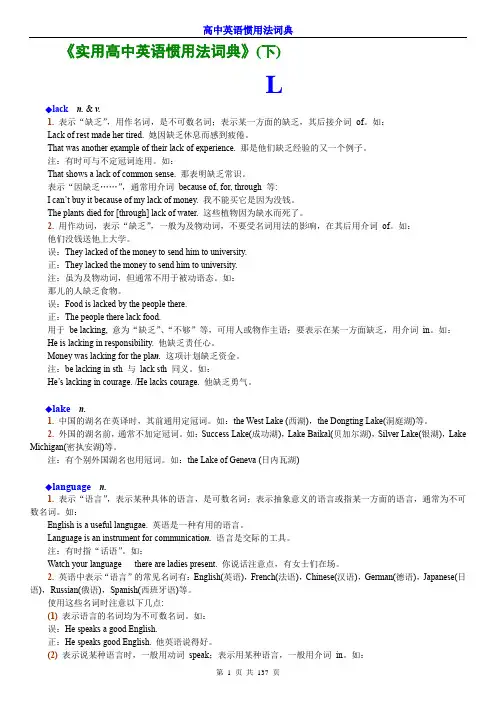
《实用高中英语惯用法词典》(下)L◆lack n. & v.1.表示“缺乏”,用作名词,是不可数名词;表示某一方面的缺乏,其后接介词of。
如:Lack of rest made her tired. 她因缺乏休息而感到疲倦。
That was another example of their lack of experience. 那是他们缺乏经验的又一个例子。
注:有时可与不定冠词连用。
如:That shows a lack of common sense. 那表明缺乏常识。
表示“因缺乏……”,通常用介词because of, for, through 等:I can’t buy it because of my lack of money. 我不能买它是因为没钱。
The plants died for [through] lack of water. 这些植物因为缺水而死了。
2.用作动词,表示“缺乏”,一般为及物动词,不要受名词用法的影响,在其后用介词of。
如:他们没钱送他上大学。
误:They lacked of the money to send him to university.正:They lacked the money to send him to university.注:虽为及物动词,但通常不用于被动语态。
如:那儿的人缺乏食物。
误:Food is lacked by the people there.正:The people there lack food.用于be lacking, 意为“缺乏”、“不够”等,可用人或物作主语;要表示在某一方面缺乏,用介词in。
如:He is lacking in responsibility. 他缺乏责任心。
Money was lacking for the pla n. 这项计划缺乏资金。
注:be lacking in sth 与lack sth 同义。
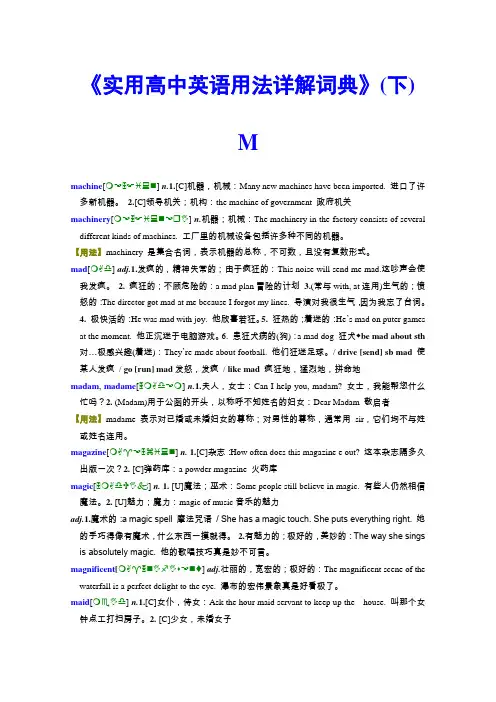
《实用高中英语用法详解词典》(下)Mmachine[❍☜☞♓⏹] n.1.[C]机器,机械:Many new machines have been imported. 进口了许多新机器。
2.[C]领导机关;机构:the machine of government 政府机关machinery[❍☜☞♓⏹☜❒✋] n.机器;机械:The machinery in the factory consists of several different kinds of machines. 工厂里的机械设备包括许多种不同的机器。
【用法】machinery 是集合名词,表示机器的总称,不可数,且没有复数形式。
mad[❍✌♎] adj.1.发疯的,精神失常的;由于疯狂的:This noise will send me mad.这吵声会使我发疯。
2.疯狂的;不顾危险的:a mad plan冒险的计划3.(常与with, at连用)生气的;愤怒的:The director got mad at me because I forgot my lines. 导演对我很生气,因为我忘了台词。
4.极快活的:He was mad with joy. 他欣喜若狂。
5.狂热的;着迷的:He’s mad on puter games at the moment. 他正沉迷于电脑游戏。
6. 患狂犬病的(狗):a mad dog 狂犬◆be mad about sth 对…极感兴趣(着迷):They’re made about football. 他们狂迷足球。
/ drive [send] sb mad 使某人发疯/ go [run] mad发怒,发疯/ like mad 疯狂地,猛烈地,拼命地madam, madame[ ❍✌♎☜❍] n.1.夫人,女士:Can I help you, madam? 女士,我能帮您什么忙吗?2. (Madam)用于公函的开头,以称呼不知姓名的妇女:Dear Madam 敬启者【用法】madame 表示对已婚或未婚妇女的尊称;对男性的尊称,通常用sir,它们均不与姓或姓名连用。
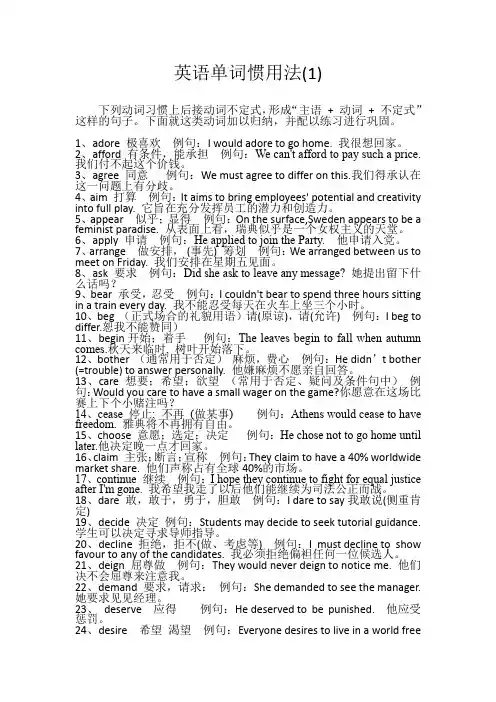
英语单词惯用法(1)下列动词习惯上后接动词不定式,形成“主语+ 动词+ 不定式”这样的句子。
下面就这类动词加以归纳,并配以练习进行巩固。
1、adore 极喜欢例句:I would adore to go home. 我很想回家。
2、afford 有条件,能承担例句:We can't afford to pay such a price.我们付不起这个价钱。
3、agree 同意例句:We must agree to differ on this.我们得承认在这一问题上有分歧。
4、aim 打算例句:It aims to bring employees' potential and creativity into full play. 它旨在充分发挥员工的潜力和创造力。
5、appear 似乎;显得例句:On the surface,Sweden appears to be a feminist paradise. 从表面上看,瑞典似乎是一个女权主义的天堂。
6、apply 申请例句:He applied to join the Party. 他申请入党。
7、arrange 做安排,(事先) 筹划例句:We arranged between us to meet on Friday. 我们安排在星期五见面。
8、ask 要求例句:Did she ask to leave any message? 她提出留下什么话吗?9、bear 承受,忍受例句:I couldn't bear to spend three hours sitting in a train every day. 我不能忍受每天在火车上坐三个小时。
10、beg (正式场合的礼貌用语)请(原谅),请(允许) 例句:I beg to differ.恕我不能赞同)11、begin开始;着手例句:The leaves begin to fall when autumn comes.秋天来临时, 树叶开始落下。

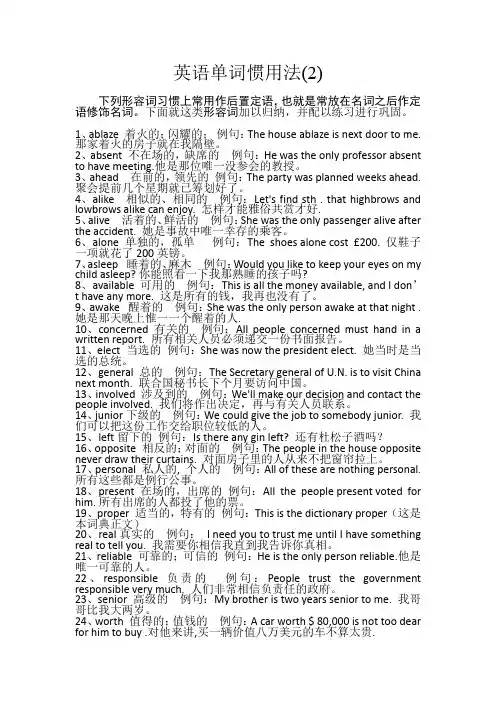
英语单词惯用法(2)下列形容词习惯上常用作后置定语,也就是常放在名词之后作定语修饰名词。
下面就这类形容词加以归纳,并配以练习进行巩固。
1、ablaze 着火的;闪耀的;例句:The house ablaze is next door to me. 那家着火的房子就在我隔壁。
2、absent 不在场的,缺席的例句:He was the only professor absent to have meeting.他是那位唯一没参会的教授。
3、ahead 在前的,领先的例句:The party was planned weeks ahead. 聚会提前几个星期就已筹划好了。
4、alike 相似的、相同的例句:Let's find sth . that highbrows and lowbrows alike can enjoy. 怎样才能雅俗共赏才好.5、alive 活着的、鲜活的例句:She was the only passenger alive after the accident. 她是事故中唯一幸存的乘客。
6、alone 单独的,孤单例句:The shoes alone cost £200. 仅鞋子一项就花了200英镑。
7、asleep睡着的、麻木例句:Would you like to keep your eyes on my child asleep?你能照看一下我那熟睡的孩子吗?8、available 可用的例句:This is all the money available, and I don’t have any more. 这是所有的钱,我再也没有了。
9、awake醒着的例句:She was the only person awake at that night .她是那天晚上惟一一个醒着的人.10、concerned 有关的例句:All people concerned must hand in a written report. 所有相关人员必须递交一份书面报告。
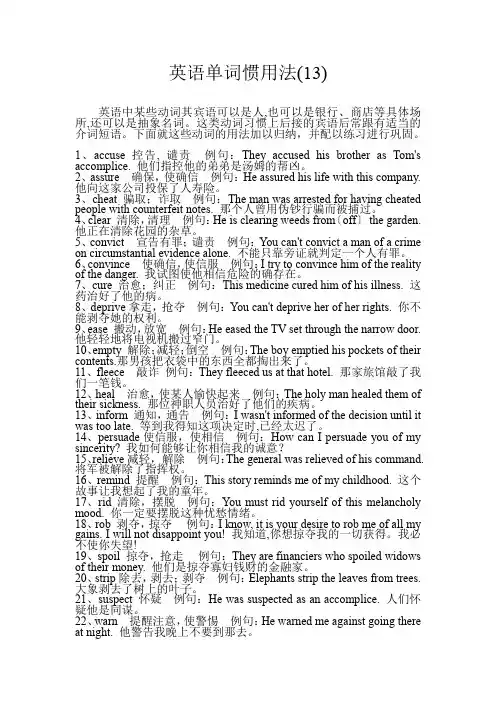
英语单词惯用法(13)英语中某些动词其宾语可以是人,也可以是银行、商店等具体场所,还可以是抽象名词。
这类动词习惯上后接的宾语后常跟有适当的介词短语。
下面就这些动词的用法加以归纳,并配以练习进行巩固。
1、accuse 控告, 谴责例句:They accused his brother as Tom's accomplice. 他们指控他的弟弟是汤姆的帮凶。
2、assure 确保,使确信例句:He assured his life with this company. 他向这家公司投保了人寿险。
3、cheat 骗取;诈取例句:The man was arrested for having cheated people with counterfeit notes. 那个人曾用伪钞行骗而被捕过。
4、clear 清除,清理例句:He is clearing weeds from〔off〕the garden. 他正在清除花园的杂草。
5、convict 宣告有罪;谴责例句:You can't convict a man of a crime on circumstantial evidence alone. 不能只靠旁证就判定一个人有罪。
6、convince 使确信,使信服例句:I try to convince him of the reality of the danger. 我试图使他相信危险的确存在。
7、cure 治愈;纠正例句:This medicine cured him of his illness. 这药治好了他的病。
8、deprive拿走,抢夺例句:You can't deprive her of her rights. 你不能剥夺她的权利。
9、ease 搬动,放宽例句:He eased the TV set through the narrow door. 他轻轻地将电视机搬过窄门。
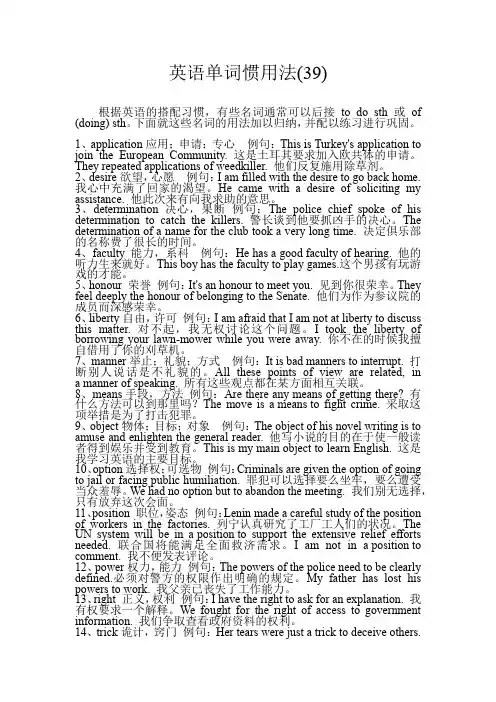
英语单词惯用法(39)根据英语的搭配习惯,有些名词通常可以后接to do sth或of (doing) sth。
下面就这些名词的用法加以归纳,并配以练习进行巩固。
1、application应用;申请;专心例句:This is Turkey's application to join the European Community. 这是土耳其要求加入欧共体的申请。
They repeated applications of weedkiller. 他们反复施用除草剂。
2、desire欲望,心愿例句:I am filled with the desire to go back home. 我心中充满了回家的渴望。
He came with a desire of soliciting my assistance. 他此次来有向我求助的意思。
3、determination 决心,果断例句:The police chief spoke of his determination to catch the killers. 警长谈到他要抓凶手的决心。
The determination of a name for the club took a very long time. 决定俱乐部的名称费了很长的时间。
4、faculty 能力,系科例句:He has a good faculty of hearing. 他的听力生来就好。
This boy has the faculty to play games.这个男孩有玩游戏的才能。
5、honour 荣誉例句:It's an honour to meet you. 见到你很荣幸。
They feel deeply the honour of belonging to the Senate. 他们为作为参议院的成员而深感荣幸。
6、liberty自由,许可例句:I am afraid that I am not at liberty to discuss this matter. 对不起,我无权讨论这个问题。
《实用高中英语惯用法词典》A◆a / an art.英语不定冠词(a/an)的用法较复杂,以下几点须注意:1.用a还是an:一般说来,辅音或半元音[j, w]开头的词要前用a。
如:He has a computer (watch). 他有一台电脑(一块手表)。
He‟s a university student (European). 他是大学生(欧洲人)。
元音开头的词前要用an。
如:This is an egg (honest boy). 这是一只鸡蛋(诚实的男孩)。
注意,有的字母(如a, e, f, h, i等)或缩略词,若第一个音是元音也应用an。
如:He missed an “n” in the word. 他写的这个单词漏了一个n。
2.不要从汉语习惯出发,漏掉必用的a/an。
如:他父亲是著名诗人。
误:His father is famous poet.正:His father is a famous poet.3.用于转化为普通名词的专有名词前,表示某某人或某某人的一部作品、艺术品等。
如:A Mr Smith wants to see you. 一位叫史密斯先生的人想见你。
He bought a complete Lu Hsun.他买了一套鲁迅全集。
4.用于转化为普通名词的物质名词前,表示相应的产品或种类,有时表示数量关系。
如:It‟s a good wine. 这是(一种)好酒。
Two coffees and a tea, please. 请来两杯咖啡和一杯茶。
5.用于具体化的抽象名词前,表示与该抽象名词意义相关的人或事等。
如:The party was a great success. 晚会开得非常成功。
It‟s a pleasure to talk with you. 同你谈话是件愉快的事。
6.用于某些由动词转化来或具有动作意味的名词前,表示一次、一番等意义。
如:Let me have a look. 让我看看吧。
《实用高中英语用法详解词典》(上)Aa [♏✋☜] / an[✌⏹☜⏹] art.(用在以元音开始的词前为an)1.一(个、件、本、块、首等):Her wish was to be a writer. 她的志愿是当作家。
/ It’s not an easy task. 这不是一件容易的任务。
/ The question before us is a difficult one. 我们面前的问题是一个困难的问题。
2.(一类事物中的)任何一个;任何:A tiger is a dangerous animal. 老虎是危险的动物。
3.每一:We went there once a year. 我们一年到那里去一次。
/ The doctor told him to bathe his eyes twice a day. 医生让他每天洗两次眼睛。
/ They cost 50p a pound. 这些每磅50 便士。
4.某一:A Mrs Smith wishes to speak to you. 有一位史密斯夫人想同你说话。
◆from A to Z 从头到尾,彻底地:know the subject from A to Z 对这一科目了如指掌【用法】1.常用于单数可数名词前,只要该名词的读音是以辅音开头,则用不定冠词a,若该名词读音是以元音开头,则用an:a book(一本书),a boy(一个男孩),an apple(一个苹果),an old man(一位老人)等。
另外读音以元音开头的字母及字母缩略词(如a, e, f, h, I, m, n, o, SOS, MBA 等)前若用不定冠词,要用an,不用a。
2.用于表示泛指,既可指同一类属中的具有代表性的任何一个,也可指同一类属中的某一个:A lion can be very dangerous. 狮子是很危险的。
3.在序数词之前使用a(an),可以表示数量或序数的增加。
单词用法词典
1. 哇塞,这单词用法词典可太重要啦!就像你在黑暗中摸索时突然出现的一盏明灯!比如说,“set”这个单词,你知道有多少种用法吗?Set the table(摆放餐桌),set a goal(设定目标),好多好多呢,没有这本词典怎么能行!
2. 嘿,你想想看,要是没有单词用法词典,那岂不是像没头苍蝇一样乱撞?比如“run”,可以是“I run every day”(我每天跑步),还能是“The water runs”(水流淌)呢,这不得好好研究下词典呀!
3. 哎呀,单词用法词典真的是超级实用啊!就好比是你学习路上的好伙伴!像“take”,“take a photo”(拍张照片),“take a break”(休息一下),多么神奇,全靠词典来指引呢!
4. 哇哦,没有单词用法词典那可不得了哇!就像航海没有指南针一样迷茫!举个例子,“put”,“put on your coat”(穿上你的外套),“put the book on the table”(把书放在桌子上),没有词典可就搞不懂啦!
5. 嘿呀,你难道不觉得单词用法词典是必不可少的吗?简直和吃饭睡觉一样重要呀!比如“get”,“get up”(起床),“get a job”(找到一份工作),没有词典,这些用法你能轻松搞清楚?
6. 哎呀呀,单词用法词典那可是宝贝呀!就仿佛是打开语言大门的钥匙!像“give”,“give me a book”(给我一本书),“give a speech”(发表演讲),离开了词典可就麻烦咯!
7. 总之,单词用法词典是非常非常重要的!没有它,你的英语学习肯定会困难重重!就像少了条腿走路一样!看看“make”,“make a cake”(做个蛋糕),“make friends”(交朋友),都得靠词典来准确掌握呀!。
1.alter v. 改变,改动,变更2.burst vi.,n. 突然发生,爆裂3.dispose vi. 除掉;处置;解决;处理(of)4.blast n. 爆炸;气流vi. 炸,炸掉5.consume v. 消耗,耗尽6.split v. 劈开;割裂;分裂a.裂开的7.spit v. 吐(唾液等);唾弃8.spill v. 溢出,溅出,倒出9.slip v. 滑动,滑落;忽略10.slide v. 滑动,滑落n. 滑动;滑面;幻灯片11.bacteria n. 细菌12.breed n. 种,品种v. 繁殖,产仔13.budget n. 预算v. 编预算,作安排14.candidate n. 候选人15.campus n. 校园16.liberal a. 慷慨的;丰富的;自由的17.transform v. 转变,变革;变换18.transmit v. 传播,播送;传递19.transplant v. 移植20.transport vt. 运输,运送n. 运输,运输工具21.shift v. 转移;转动;转变22.vary v. 变化,改变;使多样化23.vanish vi. 消灭,不见24.swallow v. 吞下,咽下n. 燕子25.suspicion n. 怀疑,疑心26.suspicious a. 怀疑的,可疑的d a. 温暖的,暖和的;温柔的,味淡的28.tender a. 温柔的;脆弱的29.nuisance n. 损害,妨害,讨厌(的人或事物)30.insignificant a. 无意义的,无足轻重的;无价值的31.accelerate vt. 加速,促进32.absolute a. 绝对的,无条件的;完全的33.boundary n. 分界线,边界34.brake n. 刹车,制动器v. 刹住(车)35.catalog n. 目录(册)v. 编目36.vague a. 模糊的,不明确的37.vain n. 徒劳,白费38.extinct a. 绝灭的,熄灭的39.extraordinary a. 不平常的,特别的,非凡的40.extreme a. 极度的,极端的n. 极端,过分41.agent n. 代理人,代理商;动因,原因42.alcohol n. 含酒精的饮料,酒精43.appeal n./vi. 呼吁,恳求44.appreciate vt. 重视,赏识,欣赏45.approve v. 赞成,同意,批准46.stimulate vt. 刺激,激励47.acquire vt. 取得,获得;学到48.accomplish vt .完成,到达;实行work n. 网状物;广播网,电视网;网络50.tide n. 潮汐;潮流51.tidy a. 整洁的,整齐的52.trace vt. 追踪,找到n. 痕迹,踪迹53.torture n./vt. 拷打,折磨54.wander vi. 漫游,闲逛55.wax n. 蜡56.weave v. 织,编57.preserve v. 保护,保存,保持,维持61. abuse v. 滥用,虐待;谩骂62. academic a. 学术的;高等院校的;研究院的63. academy n. (高等)专科院校;学会64. battery n. 电池(组)65. barrier n. 障碍;棚栏66. cargo n. (船、飞机等装载的)货物67. career n. 生涯,职业68. vessel n. 船舶;容器,器皿;血管69. vertical a. 垂直的70. oblige v. 迫使,责成;使感激71. obscure a. 阴暗,模糊72. extent n. 程度,范围,大小,限度73. exterior n. 外部,外表a. 外部的,外表的74. external a. 外部的,外表的,外面的75. petrol n. 汽油76. petroleum n. 石油77. delay vt./n. 推迟,延误,耽搁78. decay vi. 腐烂,腐朽79. decent a. 像样的,体面的80. route n. 路;路线;航线81. ruin v. 毁坏,破坏n. 毁灭,[pl.]废墟82. sake n. 缘故,理由83. satellite n. 卫星84. scale n. 大小,规模;等级;刻度85. temple n. 庙宇86. tedious a. 乏味道,单调的,87. tend vi.易于,趋向88. tendency n.趋向,趋势89. ultimate a. 极端的,最大的,最终的n. 极端90. undergo v. 经历,遭受91. abundant a. 丰富的,充裕的,大量的92. adopt v. 收养;采用;采纳93. adapt vi. 适应,适合;改编,改写vt. 使适应94. bachelor n. 学士,学士学位;单身汉95. casual a. 偶然的,碰巧的;临时的;非正式的96. trap n. 陷阱,圈套v. 设陷阱捕捉97. vacant a. 空的,未占用的98. vacuum n. 真空,真空吸尘器99. oral a. 口头的,口述的,口的100. optics n. (单、复数同形)光学101. organ n. 器官,风琴102. excess n. 过分,过量,过剩103. expel v. 驱逐,开除,赶出104. expend v. 消费105. expenditure n. 支出,消费;经费106. expense n. 开销,费用107. expensive a. 花钱多的;价格高贵的108. expand v. 扩大,扩张;展开,膨胀109. expansion n. 扩大,扩充;发展,膨胀110. private a. 私人的,个人的111. individual a. 个别的,单独的n. 个人,个体112. personal a. 个人的,私人的;亲自的114. personnel n. [总称]人员,员工;人事部门115. the Pacific Ocean 太平洋116. the Atlantic Ocean 大西洋117. the Arctic Ocean 北冰洋118. the Antarctic Ocean 南冰洋119. grant vt. 授予,同意,准予119. grand a. 宏伟大,壮丽的,重大的120. invade v. 侵入,侵略,侵袭121. acid n. 酸,酸性物质a. 酸的;尖刻的122. acknowledge v. 承认;致谢123. balcony n. 阳台124. calculate vt. 计算,核算125. calendar n. 日历,月历126. optimistic a. 乐观127. optional a. 可以任选的,非强制的128. outstanding a. 杰出的,突出的,显著的129. export n. 出口(物)v. 出口,输出130. import n. 进口(物)v. 进口,输入131. impose vt. 把...加强(on);采用,利用132. religion n. 宗教,宗教信仰133. religious a. 宗教的134. victim n. 牺牲品,受害者135. video n. 电视,视频a. 电视的,录像的136. videotape n. 录像磁带v. 把...录在录像带上137. offend v. 冒犯,触犯138. bother v. 打搅,麻烦139. interfere v. 干涉,干扰,妨碍140. internal a. 内部的,国内的141. beforehand ad. 预先,事先142. racial a. 人种的种族的143. radiation n. 放射物,辐射144. radical a.根本的;激进的145. range n. 幅度,范围v. (在某范围内)变动146. wonder n. 惊奇,奇迹v. 想知道,对...感到疑惑147. isolate vt. 使隔离,使孤立148. issue n. 问题,争论点;发行,(报刊)一期149. hollow a. 空的,中空的,空虚道150. hook n. 钩vt. 钩住151. adequate a. 适当地;足够152. adhere vi. 粘附,附着;遵守,坚持153. ban vt. 取缔,禁止154. capture vt. 俘虏,捕获155. valid a. 有效的,有根据的;正当的156. valley n. 山谷,峡谷157. consistent a. 坚固定;一致的,始终如一的158. continuous a. 继续的,连续(不断)的159. continual a. 不断地,频繁的160. explode v. 爆炸;爆发;激增161. exploit v. 剥削;利用,开采162. explore v. 勘探163. explosion n. 爆炸;爆发;激增164. explosive a. 爆炸的;极易引起争论的165. remote a. 遥远的,偏僻的166. removal n. 除去,消除167. render vt. 使得,致使168. precaution n. 预防,防备,警惕169. idle a. 懒散的,无所事事的170. identify vt. 认出,鉴定171. identify n. 身份;个性,特性172. poverty n. 贫穷173. resistant a. (to)抵抗的,抗...的,耐...的174. resolve vt. 解决;决定,决意175. barrel n. 桶176. bargain n. 便宜货vi. 讨价还价177. coarse a. 粗的,粗糙的,粗劣的178. coach n. 教练;长途公共汽车179. code n. 准则,法规,密码180. coil n. 线圈v. 卷,盘绕181. adult n. 成年人182. advertise v. 为...做广告183. advertisement n. 广告184. agency n. 代理商,经销商185. focus v. (使)聚集n. 焦点,中心,聚焦186. forbid vt. 不许,禁止187. debate n./v. 辩论,争论188. debt n. 欠债189. decade n. 十年190. enclose vt. 围住;把...装入信封191. encounter vt./n. 遭遇,遭到192. globe n. 地球,世界;地球仪193. global a. 全球的;总的194. scan vt. 细看;扫描;浏览195. scandal n. 丑事,丑闻196. significance n. 意义;重要性197. subsequent a. 随后的,后来的198. virtue n. 美德,优点199. virtual a. 实际上的,事实上的200. orient vt. 使适应,(to,toward)使朝向n. 东方167. render 解释比较长,可要仔细体会啊!1) render sth (for sth);render sth (to sb) give sth in return,or exchange,or as sth which is due 给予某物作为报偿或用以交换;回报;归还render homage,obedience,allegiance,etc.表示敬意、顺从、效忠等:a reward for services rendered 服务的酬金render good for evil 以德报怨render insult for insult 以侮辱对侮辱render sb a service/render a service to sb 为某人服务render help to disaster victims 向灾民提供援助render thanks to God 感谢上帝2) present or send in (an account)for payment 递交或开出(帐单):account rendered 开出50美元的帐单3) cause (sb/sth) to be in a certain condition 使(某人[某事物])处于某种状况:rendered helpless by an accident 因出事故而束手无策Your action had rendered our contract invalid.你们的这种做法导致双方的合同失败。
《实用高中英语用法详解词典》(下)Mmachine[] n.1.[C]机器,机械:Many new machines have been imported. 进口了许多新机器。
2.[C]领导机关;机构:the machine of government 政府机关machinery[] n.机器;机械:The machinery in the factory consists of several different kinds of machines. 工厂里的机械设备包括许多种不同的机器。
【用法】machinery 是集合名词,表示机器的总称,不可数,且没有复数形式。
mad[] adj.1.发疯的,精神失常的;由于疯狂的:This noise will send me mad.这吵声会使我发疯。
2.疯狂的;不顾危险的:a mad plan冒险的计划3.(常与with, at连用)生气的;愤怒的:The director got mad at me because I forgot my lines. 导演对我很生气,因为我忘了台词。
4.极快活的:He was mad with joy. 他欣喜若狂。
5.狂热的;着迷的:He’s mad on computer games at the moment. 他正沉迷于电脑游戏。
6. 患狂犬病的(狗):a mad dog 狂犬◆be mad about sth对…极感兴趣(着迷):They’re made about football. 他们狂迷足球。
/ drive [send] sb mad 使某人发疯 / go [run] mad 发怒,发疯 / like mad 疯狂地,猛烈地,拼命地madam, madame[] n.1.夫人,女士:Can I help you, madam? 女士,我能帮您什么忙吗?2. (Madam)用于公函的开头,以称呼不知姓名的妇女:Dear Madam 敬启者【用法】madame 表示对已婚或未婚妇女的尊称;对男性的尊称,通常用 sir,它们均不与姓或姓名连用。
《实用高中英语惯用法词典》A◆a / an art.英语不定冠词(a/an)的用法较复杂,以下几点须注意:1.用a还是an:一般说来,辅音或半元音[j, w]开头的词要前用a。
如:He has a computer (watch). 他有一台电脑(一块手表)。
He’s a university student (European). 他是大学生(欧洲人)。
元音开头的词前要用an。
如:This is an egg (honest boy). 这是一只鸡蛋(诚实的男孩)。
注意,有的字母(如a, e, f, h, i等)或缩略词,若第一个音是元音也应用an。
如:He missed an “n” in the word. 他写的这个单词漏了一个n。
2.不要从汉语习惯出发,漏掉必用的a/an。
如:他父亲是著名诗人。
误:His father is famous poet.正:His father is a famous poet.3.用于转化为普通名词的专有名词前,表示某某人或某某人的一部作品、艺术品等。
如:A Mr Smith wants to see you. 一位叫史密斯先生的人想见你。
He bought a complete Lu Hsun.他买了一套鲁迅全集。
4.用于转化为普通名词的物质名词前,表示相应的产品或种类,有时表示数量关系。
如:It’s a good wine. 这是(一种)好酒。
Two coffees and a tea, please. 请来两杯咖啡和一杯茶。
5.用于具体化的抽象名词前,表示与该抽象名词意义相关的人或事等。
如:The party was a great success. 晚会开得非常成功。
It’s a pleasure to talk with you. 同你谈话是件愉快的事。
6.用于某些由动词转化来或具有动作意味的名词前,表示一次、一番等意义。
如:Let me have a look. 让我看看吧。
I’ll give the car a good wash. 我要把车好好洗一洗。
7.用于序数词前表示数量或序数的增加。
如:He bought a second computer. 他又买了一台(即第二台)电脑。
Later she borne a third son.后来她又生了第三个儿子。
8.有的不可数名词或本来应该带定冠词(the)的名词,由于受定语(尤其是形容词)的修饰,其前一般要用不定冠词或改用不定冠词,表示某种状态,此时的不定冠词通常含有 a kind of 的意思。
如:have breakfast 吃早餐→have a quick breakfast 吃快餐the world 世界→a world like ours 像我们这样的世界注:有些不可数名词即使受形容词的修饰也不能用不定冠词,容易弄错的有:news(消息),advice(忠告),luck(运气),fortune(运气),work(工作),fun(娱乐,有趣的事),weather(天气),homework(家庭作业),housework(家务活),information(情报),behavior(行为),harm(伤害),damage(损害),progress(进步),furniture (家具),baggage(行李),luggage(行李),poetry(诗),scenery(风景)等。
9.两个单数可数名词连用表示一个整体时,只用一个不定冠词。
如:He is a teacher and poet. 他既是老师又是诗人。
There’s a horse and cart on the road. 路上有一辆马车。
10.不定冠词可用来表示“类属”,这是其基本用法,它表明的是某一类属中的每一个人和东西都能说明该类属的整体情况(有类似汉语的“举一反三”或“以此类推”的含义)。
此时也可用定冠词或名词复数形式来表示。
如:马是有用的动物。
正:A horse is a useful animal.正:The horse is a useful animal.正:Horses are useful animals.若不是说明每一个人和东西的情况,而是说整个类属,则不能用不定冠词,而要用定冠词:The tiger is in danger of becoming extinct. 老虎面临绝种的危险。
Alexander Graham Bell invented the telephone in 1876. 亚历山大·格雷汉母·贝尔于1876年发明了电话。
◆ability n.1.表示“能力”、“能够”,多为不可数名词;表示“才能”、“才干”,多用复数形式。
如:He is a man of ability. 他是位有能力的人。
He is a man of many ablilities. 他是位多才多艺的人。
2.表示有能力做某事或具有做某事的能力等,其后通常要接不定式。
如:He has the ability to speak English fluently. 他能流利地说英语。
The ability to be clearly heard is extremely importantfor newsreaders. 声音宏亮清晰对新闻广播员来说极为重要。
但在现代英语中,也可后接of doing sth(不如接不定式普遍,建议初学者谨用)。
如:I admire his ability of doing the work quickly. 我羡慕他工作做得快。
3. ability的反义词是inability,不是disability——inability表示没有能力或没有才能,而disability则指因先天缺陷或受伤变残而导致的无能。
如:Physical disability causes mental anguish. 生理伤残会引起心理苦闷。
His inability to speak French puts him at a disadvantage. 他不会说法语,这使他很吃亏。
◆able adj.1.表示“有能力的”、“能干的”,可用作表语或定语。
如:He is an able manager. 他是位有能力的经理。
He is old but still able. 他虽年老,但仍有很能干。
2.用于be able to do sth(能或会做做某事)。
如:He is able to speak English. 他会说英语。
Everyone here is able to type. 这儿的每一个人都会打字。
He will be able to get about in a week or two. 再过一两个星期左右他就能走动了。
He studied hard and was able to pass his examinations.他学习很努力,所以考试及了格。
注:be able to 不仅有多种时态形式(通常不用于进行时或与begoing to 连用),而且还可以与某些情态动词连用(通常不与can 连用),甚至还可以有非谓语形式。
如:Since his accident he hasn’t been able to leave thehouse. 自出事之后,他一直未能离开家。
You might be able to persuade him. 你也许能够说服他。
I hope to be able to do the work. 我希望能干得了这项工作。
I regret not being able to help her. 我很遗憾未能帮助她。
3. able 的比较级和最高级通常是abler 和ablest,也可以是more able 和most able,有时还可用better able和best able。
如:You are better able to do it than I (am). 你比我更有能力做这件事。
She’s the person best able to cope. 她是个最能妥善处理问题的人。
4. 若要加强语气,其前除可very, quite, perfectly等修饰外,有时还可用well修饰。
如:He is quite [well] able to take care of himself. 他完全有能力照顾自己。
He’s a very able student; he’s just too lazy. 他是个很有能力的学生,只是太懒了。
若受just, only just修饰,则表示“只能”“仅能”。
如:I was just able to make out a dark figure in the distance. 我只能看见远处有个黑影。
5. able的反义词是unable(不能的,不会的),不是disable,后者是动词,其意为“使残废”“使无能力”。
比较:They were unable to reach a decision. 他们没法做出决定。
Now that he was disabled, his house had become a prison to him. 因为他残废了,他的房子就成了他的牢笼。
◆about prep. & adv.1.表示“大约”,通常用于数字前。
如:It costs about $10. 这需10美元左右。
He arrived at about 10 o’clock. 他大约10点钟到达。
2.在动词know, hear, speak 等之后用不用介词about, 含义有差别。
如:I have heard about him, but I don’t know him. 我听到过一些关于他的事,但不认识他这个人。
I’ve heard of him, but I don’t know about him. 我听说过他,但我不知道有关他的情况。
试比较:He knows her. 他认识她。
He knows of her. 他知道有她这样一个人。
He knows about her. 他知道有关她的情况。
3. be about to (do),意为“即将”、“马上”。
注意该短语不与具体的时间状语(如:soon, tomorrow, immediately 等)连用。
如:We are about to leave for Beijing. 我们正要动身去北京。
不说:He is about to leave here tomorrow.注意该短语可与并列连词when(这时)连用。